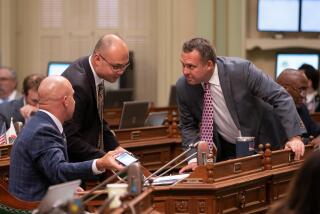Bates Used Overdrafts as Campaign Loans : House bank: Former San Diego congressman concedes that $30,300 in bad checks gave him an unfair edge in 1990 primary.
- Share via
SAN DIEGO — Former Rep. Jim Bates acknowledged Friday that he knowingly used the House bank’s overdraft protection when he wrote four bad checks totaling $30,300 as loans to his reelection campaign on the eve of the 1990 Democratic primary.
Opening his financial records in what he termed “the most comprehensive disclosure” of any congressman caught in the “Rubbergate” scandal, Bates conceded that the ability to tap the House bank for campaign funds gave him an edge over opponents who had to rely on their own fund raising.
“I think you could argue it’s an unfair advantage or perk that members of Congress had,” Bates said.
But Bates contended that he poured about $38,000 into the House bank in about the same period that he wrote $30,300 in bad checks to his campaign--late May and early June, 1990. The deposits were a sincere attempt, he said, to cover the checks, each of which cleared within seven days of being presented to the House bank.
He said he could have taken out a loan or dipped into personal cash reserves for the campaign against challenger Byron Georgiou, but used the overdraft protection because he had been advised that it was available.
Bates, a Democrat who lost his seat to Rep. Randy (Duke) Cunningham (R-San Diego) in 1990, leads the list of current and former San Diego congressmen with $170,685 worth of overdrafts during the 39-month period ending Oct. 3 that was examined by the House Ethics Committee.
According to Thursday’s edition of the Capitol Hill newsletter Roll Call, Bates is also one of only three representatives to admit having written bad checks to cover campaign loans. All three apparently wrote at least one bad check as part of the loans.
Vincent Hall, press secretary for San Diego City Councilman Bob Filner, one of Bates’ opponents in the current race for south San Diego’s 50th Congressional District, said Bates’ decision to rely on the overdraft protection in the hectic final days of the 1990 primary will not sit well with a public that resents the privileges and perquisites of Congress.
“Jim Bates knew that he had access to an interest-free, penalty-free overdraft service that none of the other candidates had,” Hall said. “His decision to use that service in the final hours of the campaign was an abuse of the public trust and (was) designed solely to preserve his position of power.”
On Wednesday, Bates said he wrote three overdrawn checks to his campaign for about $18,000. But according to House bank records that Bates showed to three reporters at his campaign consultant’s office Friday, there were four checks and the total was nearly twice as high.
Bates wrote a $6,000 check to his campaign May 23 that was presented to the House bank two days later, but held for insufficient funds until May 29 or May 30.
He wrote a $10,000 check May 26, which was presented to the bank May 31 and cleared June 1. He wrote another May 30 for $4,300, which was presented June 1 and held until June 8.
The final check, for $10,000, was written June 6--the day after the primary--presented June 8 and cleared June 13.
Between May 23 and June 13, Bates deposited about $38,000 into his House bank account. But because Bates was writing other checks besides the ones to his campaign, and because nearly $10,000 was not deposited until June 13, there were insufficient funds to cover Bates’ loans to his campaign.
Ironically, Bates beat Georgiou in the primary by more than a 3-2 margin, despite being heavily outspent by his challenger and running under the cloud of a 1989 rebuke from the House Ethics committee for sexually harassing female staffers.
Bates said he has no intention of dropping out the current race for the 50th District seat, adding that a tracking poll he conducted Thursday showed he has lost only five points as a result of the bad-check disclosures.
More to Read
Get the L.A. Times Politics newsletter
Deeply reported insights into legislation, politics and policy from Sacramento, Washington and beyond. In your inbox twice per week.
You may occasionally receive promotional content from the Los Angeles Times.










